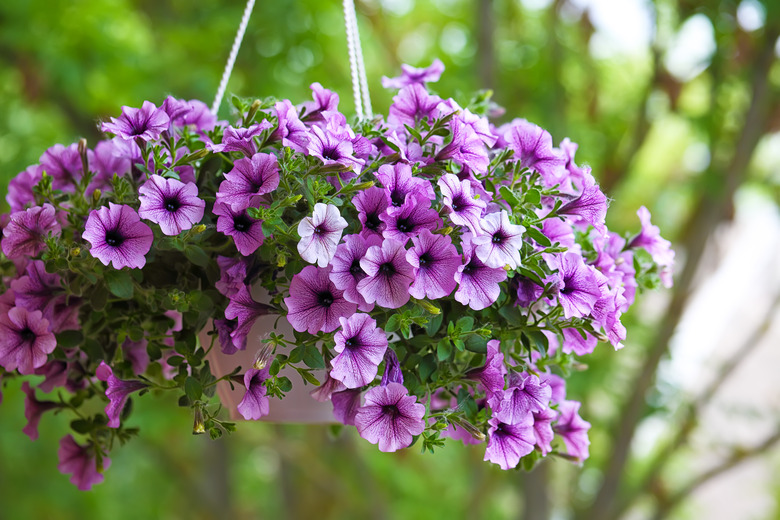What Can I Spray On Petunias So Bugs Do Not Eat Them?
Finding the right option to spray on petunias (Petunia x hybrida) so bugs do not eat them can keep your cheery, long-lasting blooms beautiful. Petunias are easy-to-grow warm-season plants that grow as perennials in USDA zones 10-11 and annuals elsewhere in beds, containers, hanging baskets or window boxes. They sport showy flowers in a variety of colors including pink, red, white, purple and yellow. Petunias are one of the most popular plants for gardeners, but for different reasons, several types of insects like petunias too.
Tip
You have several options for protecting your petunias from pests, including Btk, diatomaceous earth, horticultural oils and insecticidal soap.
Spray on Petunias: Btk
Spray on Petunias: Btk
Bacillus thuringiensis subsp. kurstaki, or BtK, is a bacterium that occurs naturally in soils. When levels are high enough, it sickens insects like loopers, moth larvae, armyworms, cutworms, hornworms and other caterpillar pests that like to munch on petunia leaves and petals.
BtK is available in many forms including dusts, liquids and granules. Apply the petunia insecticide to the petunia plant so that when the pest feeds, it ingests the BtK. The toxin causes paralysis, which stops the pest from feeding and kills it within a few days.
Diatomaceous Earth as Insecticide
Diatomaceous Earth as Insecticide
Use diatomaceous earth (DE) as a broad spectrum insecticide to kill soft-bodied petunia pests like caterpillars, thrips, aphids, slugs and snails. It works by dehydrating the insect to the point of death.
Apply DE to the foliage and soil around your petunias. Restrict application to areas where pests are a problem because it also kills beneficial pollinating insects like honeybees and butterflies. When applying DE, wear a mask because it may irritate mucous membranes.
Horticultural Oil Treatments
Horticultural Oil Treatments
Petunia plants that have pests like aphids, mites, mealy bugs, scale and whiteflies may benefit from horticultural oil. Petunia pests and their eggs are smothered by horticultural oil. Lightweight horticultural oils provide more thorough leaf coverage, and dormant horticultural oils are heavier versions for woody plants and trees.
Follow the package mixing instructions, and spray the horticultural oil on the tops and bottoms of the petunia foliage to keep bugs away. If daytime temperatures exceed 85 degrees Fahrenheit or nighttime temperatures drop below freezing, avoid using horticultural oils. Spray either early in the morning or in the evening to avoid direct sunlight.
Neem Oil Treatments
Neem Oil Treatments
Neem oil is derived from the seed of the neem tree and contains a chemical called azadirachtin, which is toxic to many types of insects but is harmless to mammals. Neem oil acts as a repellant, growth regulator and insect poison. It has systemic properties that enable the petunia plant to absorb the neem's extracts into the petunia's tissues. It causes insects like leafminers and other boring insects to stop feeding because the plant becomes unpalatable. If the petunia pest continues to feed the insect is unable to molt or reproduce.
Mix the neem oil according to the package instructions. Spray it over all parts of the plant. You might need to reapply the neem oil treatment again after a week.
Insecticidal Soap Treatments
Insecticidal Soap Treatments
Another less-toxic treatment option that protects most beneficial insects is insecticidal soap. It works on soft-bodied insects, including aphids, thrips and mites. To take care of the pest infestation, insecticidal soap has to come into contact with the insects directly.
Ready-to-use insecticidal soap is easy to use right out of the bottle. Spray it on all parts of the plant, including tops and bottoms of leaves, to ensure it reaches any bugs that are already on the plant. Treating the bugs early can keep more bugs from coming onto the plant. You might need to repeat the treatment weekly or biweekly.
